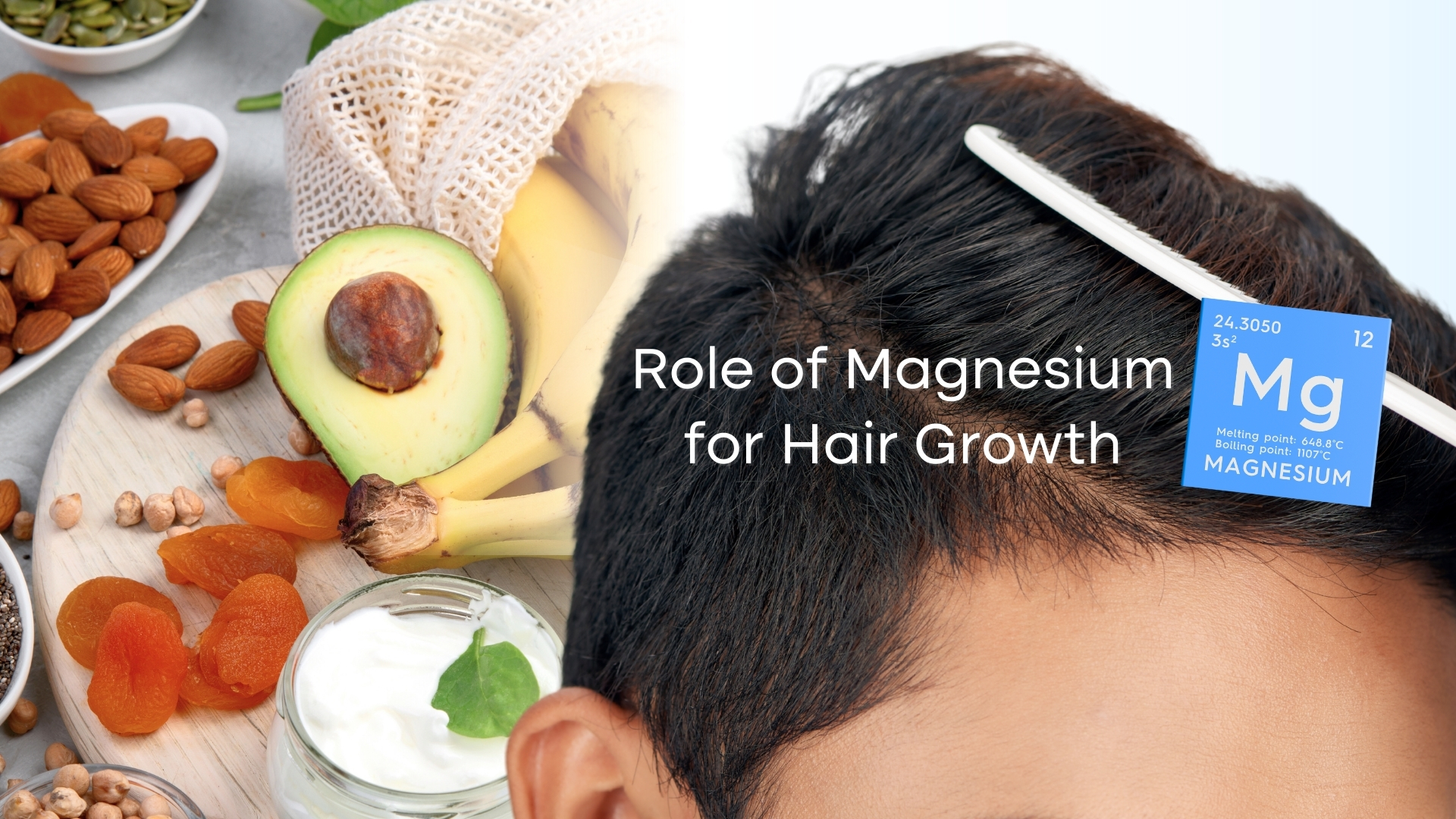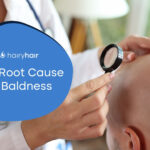Understanding the Role of Magnesium for Hair Growth

Magnesium is a vital mineral that aids many body functions, including hair growth. After calcium, it’s the second most prevalent mineral in the body. Having sufficient magnesium is central to encouraging healthy hair growth.
A magnesium deficiency will disrupt the normal cycle of hair growth. If your body fails to get enough magnesium, your hair follicles will stop functioning sooner than they would have. This causes new hair to grow at a reduced pace. We are going to discuss the link between magnesium and hair growth and how to increase your magnesium intake in this article.
We’ll also discuss how Hairy Hair can help you if you suffer from baldness.
How is magnesium good for your hair?
Magnesium is good for your hair in many ways to ensure it is healthy and grows:
- Healthy follicles: Magnesium stimulates the development and growth of follicles. Follicles are the units that grow hair strands. Lack of magnesium can result in a reduction of the growth of hair follicles and thinning, easily breakable hair.
- Encourages blood supply: Proper blood supply is essential to make your hair follicles well-nourished and well-oxygenated. A proper blood supply can stimulate good hair growth.
- Regulates the level of calcium: Magnesium helps balance the level of calcium in your body. Excess calcium on your scalp could result in breakage of your hair and further loss of your hair, and therefore, magnesium regulates it.
- Regulates hormones: Hormonal imbalance may cause hair loss, and so magnesium is essential to keep your hormones balanced.
Food rich in magnesium
You can include a lot of magnesium sources in your diet, and some of the best of them are given below:
- Leafy greens: Spinach and kale are great sources of magnesium
- Nuts and seeds: Almond and cashew nuts, pumpkin seeds, and sunflower seeds are included here.
- Whole grains: Quinoa and brown rice are some examples.
- Legumes: Black and kidney beans and chickpeas have magnesium.
- Fish: Halibut, salmon, and mackerel are all great sources of magnesium.
If you are not getting enough magnesium, you can take a supplement. But first, visit a doctor before taking a supplement.
This is due to the fact that too much magnesium is dangerous to your health, like making you experience diarrhea and nausea. Make sure that you are taking only the recommended amount of daily intake so that you will not be hit by these side effects and others.
Magnesium for scalp health
A healthy scalp is required to support healthy hair growth. Some of the ways through which magnesium helps to keep your scalp healthy for hair growth are:
- Inflammation reduction: The anti-inflammatory property of magnesium reverses the harm done to the hair follicles that can result in inflammation-mediated hair loss.
- Regulation of sebum secretion: Magnesium regulates sebum secretion in your scalp. It is natural scalp oil; your scalp needs it to prevent drying, but excessive secretion clogs your hair follicles.
- Facilitates enzyme activity: In a bid to ensure healthy hair growth, enzymes need to be created, and magnesium will ensure this occurs.
- Relaxation from stress: Magnesium can lower stress and facilitate relaxation. Stress is among the primary causes of hair loss in many people.
Stress and lifestyle contribute to magnesium and hair health
Stress and lifestyle may influence your magnesium levels and, therefore, the health of your hair.
Stress depletes magnesium reserves as the body uses its reserves when it is stressed and releases stress hormones. The health of your hair can deteriorate with a lack of magnesium.
If your diet is full of processed foods that are not nutrient-dense, then that will cause a magnesium deficiency. That will cause low enzyme production, which is required for healthy hair growth. In addition, poor sleep can cause low enzyme production.
Excessive drinking is also a frequent cause of low magnesium. This tightens the blood vessels in your scalp and robs your hair follicles of oxygen and nutrients.
Magnesium and hormonal balance
DHT
The most frequent reason for baldness is the dihydrotestosterone (or DHT) hormone. It binds to hair follicles and pushes them towards miniaturisation, which means your follicles become smaller. This eventually leads to hair loss.
Magnesium is attributed to reducing DHT levels, as per Trends in Food Science & Technology. Magnesium acts to shut down 5-alpha reductase activity that initiates testosterone’s conversion to DHT. Such reduced activity of 5-alpha reductase tends to reduce DHT levels and prevent hair loss from recurring.
Insulin
Keeping insulin within a balanced stage is crucial for maintaining a level blood sugar, and magnesium serves as the backbone in doing it. If insulin is constantly increased, or else the body is starting to fight insulin, then it can generate imbalances with hormones. That can lead to hair loss.
Estrogen and progesterone
Magnesium also balances the hormones estrogen and progesterone in our body. Too much estrogen and too little progesterone can cause problems such as hair loss and other issues. It is very important to have a good balance between these hormones to stay healthy.
What can I do to combat my hair loss?
Magnesium is an important nutrient for many functions in your body, and this includes hair growth. While magnesium contributes to regulating processes that help maintain healthy hair, making sure you’re getting enough magnesium is just one hair growth treatment.
Hair loss is the result of so many varied influences, and magnesium can’t reverse them all. If you are experiencing hair loss, a multistep treatment regimen for many different conditions can provide you with the best hope to regrow lost hair and prevent further shedding.
Hairy Hair has created a one-a-day supplement in a highly concentrated form of powerful active ingredients. It is both a DHT blocker and a vasodilator. It dilates the blood vessels in your scalp so your hair follicles receive improved blood flow to allow more oxygen and nutrients in.
It also contains natural compounds that induce greater keratin formation, the keystone protein of hair, as well as an anti-inflammatory effect.
Magnesium for hair and alternative treatments
Magnesium also plays a critical role in promoting healthy hair growth. It does this by correcting the balance of calcium, stimulating circulation, and reducing inflammation to try to spur a healthy scalp environment that favours hair growth. On top of that, magnesium assists in modulating the endocrine balance within your body, as well as reducing the activity of DHT.
Both a lack of magnesium and too much magnesium can result in hair loss, among other symptoms, so you must get the right balance. If you are thinking of taking a magnesium supplement, then you ought to discuss it with your physician first and get your magnesium level measured.
Extreme magnesium levels are just one potential cause of hair loss, and restoring them may not be enough to tackle your hair loss. If you’re worried about your hair loss and want to take action, contact Hairy Hair today.
After you’ve done a quick online questionnaire, our trained staff will review your data to get a better sense of you and your hair loss. Then, we’ll have one of our certified Australian GPs call you to review your personal treatment plan with you and answer any questions that you might have.
Lastly, your prescription will be delivered to your doorstep, avoiding any pesky clinic appointments. Manage your hair loss treatment from home and enjoy the one-on-one care every step of the way through all aspects of your journey towards potentially regained hair and confidence.


